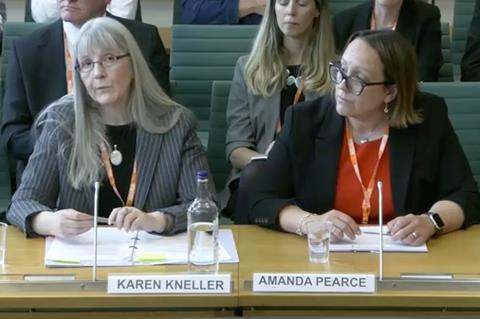Most applicants for case reviews are 'simply not represented', the chief executive of the Criminal Cases Review Commission told MPs this week. Defending the miscarriage of justice watchdog's performance, Karen Kneller told the Commons justice committee that more funding would allow the organisation to ‘do more' to support applicants.
Kneller appeared with Amanda Pearce, the CCRC's casework operations director, in a one-off evidence session on the work of the commission.
Asked by Labour MP Sarah Russell about the CCRC’s running costs of ‘about £10m, expenditure of £9.5m in 23/24 up from £6.5m in 22/23’, Russell said: ‘I am wondering…whether you feel overall that £10m a year for 30 referrals [back to the courts] a year, looks like value?’
Kneller, a barrister, said: ‘[If it is] good value for money, I am not sure that is a question for me to answer. I would say every referral we find is good value for money. No-one has, I think, said what we should be finding, what is the right number of referrals. Because the majority of cases that we see, we do not see anything in there that would lead to a successful referral if I can use that as shorthand.’

In response to a question from Russell on what the pair believed would be ‘the right number of referrals’, Pearce, a solicitor, said: ‘I do not think there is a right number of referrals. We can only refer those cases that meet the statutory test. You would be absolutely right that would be an awful lot of money if we had only looked at the 30 cases that were referred. But to find those 30 cases we have to look at everything that comes through the door, so that is 1,500-1,600 cases a year that we have to work on.
Read more
‘We have to look at each of those cases carefully to assess whether they meet the test for referral. If you were only looking at such a small number of cases that would not be good value for money but we have to look at everything and we have to look at it carefully.’
Pearce told the committee the CCRC examined and made a decision on 1,482 cases last year.
The committee also dealt with remote working, the CCRC’s leadership, training, and the Andrew Malkinson wrongful conviction case.
On Malkinson, Kneller said: ‘Without a doubt we got that case wrong, Mr Malkinson was failed. We made mistakes on that case, we apologised, the organisation apologised, the decisions made then around when to apologise are probably decisions that would not be made today. Absolutely I extend my apology to Mr Malkinson. Everyone in the organisation deeply regrets what happened on that case.’
This article is now closed for comment.



























1 Reader's comment